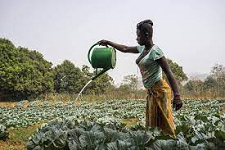Over one hundred of Africa’s leading and emerging leaders in agriculture met in a two-day virtual forum last week to discuss issues related to environmental sustainability.
The Forum was convened by the Centre for African Leaders in Agriculture (CALA), an AGRA-led initiative, and was the second installment of the ongoing CALA Leadership Forum series.
Participants and speakers, drawn from government, private sector and civil society, engaged under the theme: “Collaborative Leadership for Environmental Sustainability and Agroecology in African Agriculture”. The Forum focused on the need for a combination of innovative solutions like agroecology, and the protection of the natural environment through effective soil and water management practices.
“We can feed our people, preserve our land, water and forest resources, and grow our economies in line with Africa’s 2063 Agenda,” said Dr. Apollos Nwafor, AGRA’s Vice President for Policy and State Capability in the forum’s opening plenary.
He cited the success of an agroecology pilot in Kenya’s Western region, which has led to the restoration of over 6000 hectares of damaged forest land. “CALA provides many opportunities for us to draw on such working examples and adopt them in our various countries to drive transformation,” he added.
“CALA’s objective is to build collaborative leadership, and to create tailored, hands-on learning experiences for senior and emerging African leaders that will promote transformation towards sustainable agricultural systems,” said Rebecca Harrison, CEO and Co-Founder of the African Management Institute (AMI).
AMI is CALA’s lead implementation and learning partner, guiding cohorts of 80 leaders from 8 focus countries through the Centre’s inaugural 16-month Advanced Leadership Program.
“Agriculture has a significant effect on and is significantly affected by environmental practices and sustainability,” said Policy LINK Chief of Party Steve Smith. Policy LINK is also a CALA partner and has been instrumental in supporting the Centre’s coaching component. “Everyone is a stakeholder, and, as such, the challenges faced will require the kind of leadership that brings us together to collectively address them.”
The Forum also discussed the linkage between policy, land, and water management with Ghana’s Chief Director in the Ministry of Environment, Cynthia Asare Bediako, highlighting the urgent need for policies that promote sustainable farming.
“We need policies that ensure that the system of farming enables the soil to remain in place. In Ghana, for instance, we recently completed a project that enabled us to teach farmers the right way of planting, along the contours, ensuring that we do not deplete the soil through rampant cropping and to avoid the loss of soil nutrients,” she said.
CALA was conceptualized by AGRA and is implemented in collaboration with the African Management Institute (AMI) and USAID’s Policy LINK, with funding from the German Development Cooperation through the KfW Development Bank.
Its 16-month Advanced Leadership Program focuses on supporting leaders in government, the private sector, and civil society with the practical skills to navigate, coordinate and better implement solutions to national agriculture challenges.
Founded in 2006, the Alliance for a Green Revolution in Africa (AGRA), is an African-led African-based organization that seeks to catalyze Agriculture Transformation in Africa. AGRA is focused on putting smallholder farmers at the center of the continent’s growing economy by transforming agriculture from a solitary struggle to survive into farming as a business that thrives.
AMI’s programs combine online and mobile tools with in-person workshops and on-the-job practice and support. AMI has directly trained over 35,000 people in over 39 countries. AMI has offices in Nairobi, Kenya, Kigali, Rwanda, and Johannesburg, South Africa.
Policy LINK is a global Feed the Future program that strengthens the leadership capacity of public, private, and civil society actors and fosters collective action among them for better policy systems. Feed the Future is America’s global hunger and food security initiative, led by USAID.

